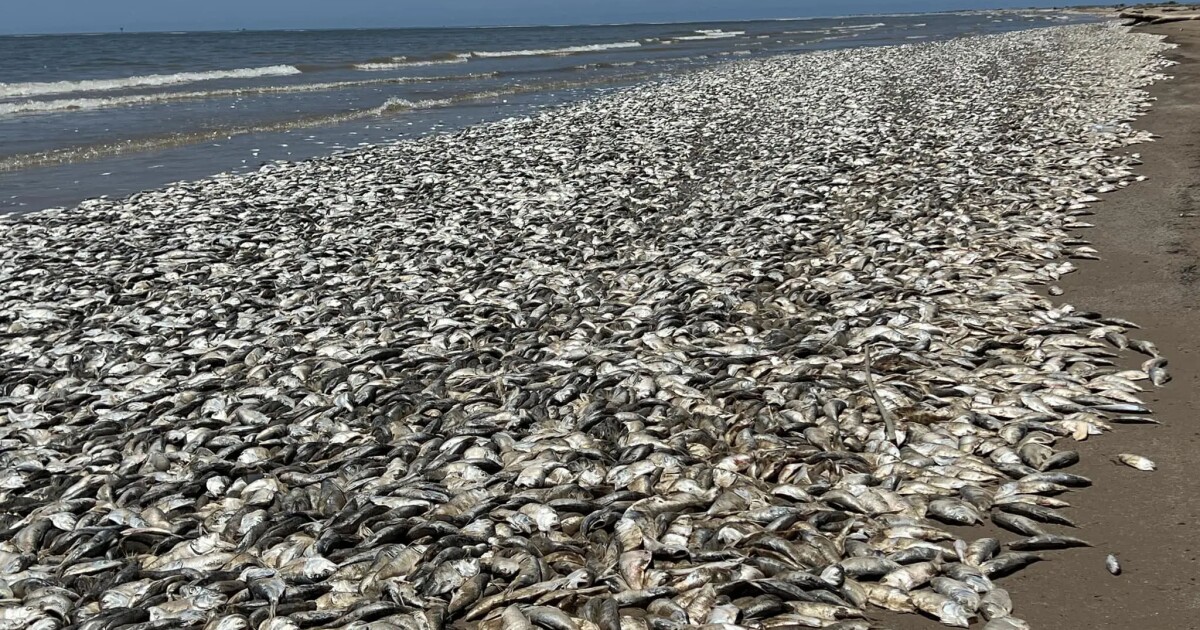
Waves upon waves of dead fish washed ashore on beaches south of Houston over the weekend, causing foul smells and unsightly scenery as well as concerns among the public.
The dead fish covered the sands at Quintana Beach County Park, Bryan Beach and other beaches in the Freeport area, where the Brazos River feeds into the Gulf of Mexico, from Friday until Sunday, according to a series of weekend Facebook posts by Quintana Beach County Park. The park's pedestrian beach had mostly been cleared as of Sunday afternoon, and its public beach was set to be cleaned beginning Monday.
Texas Parks & Wildlife Department spokesperson Julie Hagen said Monday the mass fish casualties were caused by low oxygen levels in nearby water, because of a recent rise in water temperatures and other likely factors, with the fish essentially having suffocated. She said the fish kill is unrelated to nearby industrial activity as the aforementioned beaches are next to Freeport LNG, one of the world's largest liquefied natural gas facilities.
"According to our Kills and Spills Team, we are accustomed to seeing low dissolved oxygen events this time of year, especially with all the rainfall the rivers of Southeast Texas are receiving this spring and summer," Hagen wrote in an email. "This fish kill is not the result of a particular pollution event or spill from nearby industry. It originated in the Lower Brazos River and was pushed downstream into the Gulf where the dead fish were then pushed on to the nearby beaches due to currents and wave action."
Staff at Quintana Beach County Park, which is closed Monday, did not immediately respond to a voicemail seeking comment. The Brazoria County Parks Department, which oversees Quintana Beach County Park, did not immediately respond to a Monday email.
According to Facebook posts by the county park, its beach was inundated with the dead fish on Friday, Saturday and Sunday morning. Gulf menhaden were the most impacted species, although photos posted by the park also showed dead rays and sharks, among other types of fish.
Quintana Beach County Park had advised visitors to avoid the beach as well as the water over the weekend, because of risks associated with harmful bacteria and sharp fins. Park staff was using machines to remove the washed-up fish from the beach and bury them in sand dunes, it wrote on Facebook.
"The pedestrian beach is cleared with the exception of a spattering of fish that the machinery couldn't get," the park wrote Sunday afternoon. "High tides over the next couple of days should sift the rest down into the sand and bury them. Today is a red flag day as far as surf conditions are concerned, so it wouldn't hurt to give it a couple more days to let everything settle out before making that beach trip."
Hagen said most fish kills seen along the Texas coast are localized events and do not correlate with overall temperatures and oxygen levels in the Gulf. Events like the one in the Freeport area are common in the summer when temperatures increase, she said, adding that it is a natural occurrence.
Sunlight and the respiration of aquatic life contribute to daily variations in dissolved oxygen concentration, with more sunlight resulting in more photosynthesis and therefore an increased level of dissolved oxygen in the water, Hagen said. There is less photosynthesis occurring at night and on cloudy days, although animals and plants in the water continue to consume oxygen, resulting in lower dissolved oxygen levels.
"If there isn't enough oxygen in the water, fish can't ‘breathe,'" Hagen said. "Often before a kill event occurs, fish can be seen trying to get oxygen by gulping at the surface of the water early in the morning. Some fish may also be lying on the bottom or at the edge of the water."
Quintana Beach County Park, in a Saturday Facebook post, cited three likely factors for the fish kill it witnessed: Recent cloudy skies in the area; warmer water, especially in shallow areas where the menhaden could have been swimming; and calm seas, since the area has had "very little wave action" in recent weeks and oxygen enters the water in part by the force of wind and waves.
"It was the perfect storm to deplete the oxygen levels inshore," the park wrote.
"fish" - Google News
June 13, 2023 at 04:36AM
https://ift.tt/TbK9CzI
Texas beaches inundated with dead fish, likely due to rise in water temperature - KUT
"fish" - Google News
https://ift.tt/bpKh5Lx
https://ift.tt/x7iSrTl
Bagikan Berita Ini














0 Response to "Texas beaches inundated with dead fish likely due to rise in water temperature - KUT"
Post a Comment